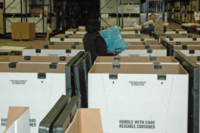Nurses want rest of U.S. to follow California’s lead in Ebola protection
State establishes mandatory guidelines for healthcare worker PPE, training

 National Nurses United (NNU) is calling on other states to follow the mandatory safeguards recently established by California to protect nurses, other health workers, and the public from the threat of the deadly Ebola virus.
National Nurses United (NNU) is calling on other states to follow the mandatory safeguards recently established by California to protect nurses, other health workers, and the public from the threat of the deadly Ebola virus.
California state officials updated Ebola guidance for all California hospitals that require the optimal level of personal protective equipment, comprehensive training procedures, and other protocols that mirror the standards NNU and the California Nurses Association RNs have campaigned for in California and across the nation for two months.
NNU says it will press for legislation and regulation in other states, and continue to demand the federal government enact mandatory guidelines modeled on the California standards that all hospitals must follow for Ebola and other epidemics. More than 60,000 people have signed an on-line petition calling for just that.. (Click here to view the petition.)
Ebola knows no borders
“California nurses, other health workers and the public will be safer, but Ebola and other pandemics know no borders,” said NNU and CNA Executive Director RoseAnn DeMoro. “Federal officials and other states should adopt the same standards. If California can act, all our other elected leaders and agencies can as well.”
The new California standards build on existing Cal/OSHA regulations and clarify the requirements hospitals must meet to ensure hospitals and health care workers take the proper steps to safely provide care for suspected or confirmed Ebola patients in hospitals, where the risk of infectious disease transmission is the highest.
NNU characterizes the current voluntary recommendations by the Centers for Disease Control and Prevention (CDC) “unenforceable.”
Noncompliant hospitals will face penalties
By contrast, California regulations are mandatory and impose civil penalties on hospitals that fail to comply with the new guidelines. The CNA says it will monitor hospital compliance with the guidelines and work closely with Cal-OSHA on enforcement.
The CAN and NNU commended California Governor Jerry Brown for departing “from the paralysis of government and corporate action” and moving to protect the public and health care workers.
“That’s how government should work,” DeMoro said. “Gov. Brown has delivered an example for the nation.”
The groups also praised Cal/OSHA for developing guidance on the standards.
Under the new standards:
- California hospitals are now required to have full-body protective suits, that meet the American Society for Testing and Materials F1670 standard for blood penetration, F1671 standard for viral penetration, that leave no skin exposed or unprotected, and that are available for all hospital staff providing care for a suspected or confirmed Ebola patient, employees cleaning contaminated areas, and staff assisting other employees with the removal of contaminated protective gear.
- Hospitals must provide powered air-purifying respirators (PAPRs) with a full cowl or hood for optimal protection for the head, face and neck of any RN or other staff who provide care for a suspected or confirmed Ebola patient. Like the suits, this requirement extends to cleaning contaminated areas or assisting staff in removal of protective gear. Both these respirators and the suits have been a key NNU demand, and as Cal OSHA noted, the respiratory protection standards “go beyond the current (CDC) recommendations.”
- Infection by the Ebola virus can occur not just through direct contact with droplets of bodily fluids, but even through aerosol transmission of fluids from coughing or other aerosol exposure with an Ebola patient.
- Regular training is required for any staff who are at risk of exposure, including hands on practice in teams with the ability to interact and ask questions. Computer based training does not meet the requirement.
- Employees who report hospitals that violate the regulations are protected from retaliation by their employers with whistleblower protection.
Looking for a reprint of this article?
From high-res PDFs to custom plaques, order your copy today!









